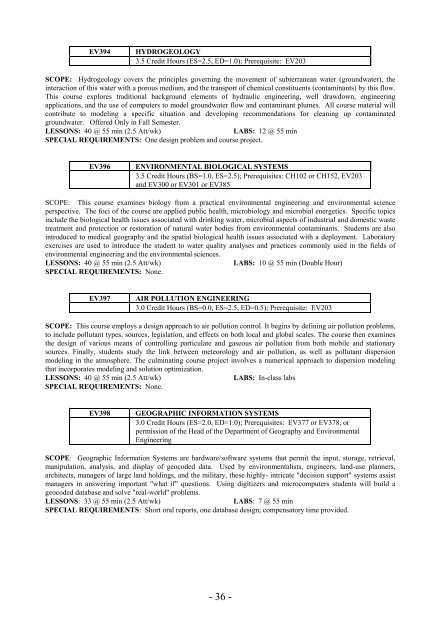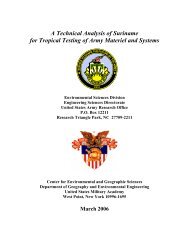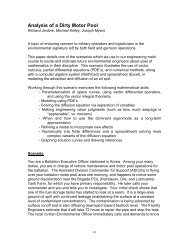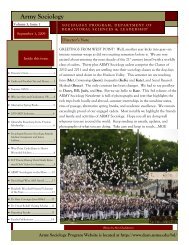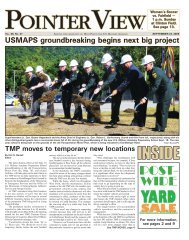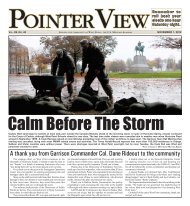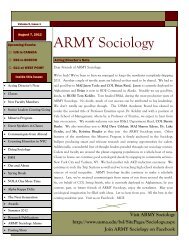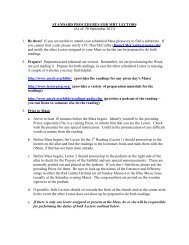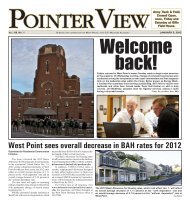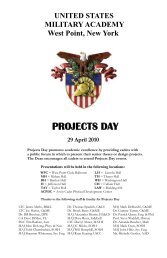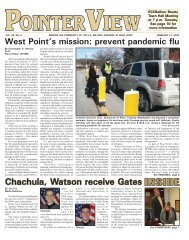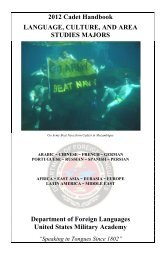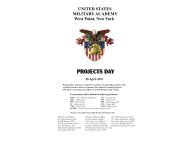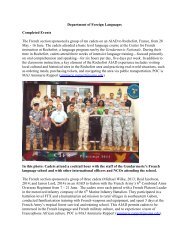GENE Catalog (aka Grey Book): Class of 2010 - West Point
GENE Catalog (aka Grey Book): Class of 2010 - West Point
GENE Catalog (aka Grey Book): Class of 2010 - West Point
- TAGS
- gene
- catalog
- grey
- class
- www.usma.edu
You also want an ePaper? Increase the reach of your titles
YUMPU automatically turns print PDFs into web optimized ePapers that Google loves.
EV394 HYDROGEOLOGY<br />
3.5 Credit Hours (ES=2.5, ED=1.0); Prerequisite: EV203<br />
SCOPE: Hydrogeology covers the principles governing the movement <strong>of</strong> subterranean water (groundwater), the<br />
interaction <strong>of</strong> this water with a porous medium, and the transport <strong>of</strong> chemical constituents (contaminants) by this flow.<br />
This course explores traditional background elements <strong>of</strong> hydraulic engineering, well drawdown, engineering<br />
applications, and the use <strong>of</strong> computers to model groundwater flow and contaminant plumes. All course material will<br />
contribute to modeling a specific situation and developing recommendations for cleaning up contaminated<br />
groundwater. Offered Only in Fall Semester.<br />
LESSONS: 40 @ 55 min (2.5 Att/wk) LABS: 12 @ 55 min<br />
SPECIAL REQUIREMENTS: One design problem and course project.<br />
EV396 ENVIRONMENTAL BIOLOGICAL SYSTEMS<br />
3.5 Credit Hours (BS=1.0, ES=2.5); Prerequisites: CH102 or CH152, EV203<br />
and EV300 or EV301 or EV385<br />
SCOPE: This course examines biology from a practical environmental engineering and environmental science<br />
perspective. The foci <strong>of</strong> the course are applied public health, microbiology and microbial energetics. Specific topics<br />
include the biological health issues associated with drinking water, microbial aspects <strong>of</strong> industrial and domestic waste<br />
treatment and protection or restoration <strong>of</strong> natural water bodies from environmental contaminants. Students are also<br />
introduced to medical geography and the spatial biological health issues associated with a deployment. Laboratory<br />
exercises are used to introduce the student to water quality analyses and practices commonly used in the fields <strong>of</strong><br />
environmental engineering and the environmental sciences.<br />
LESSONS: 40 @ 55 min (2.5 Att/wk) LABS: 10 @ 55 min (Double Hour)<br />
SPECIAL REQUIREMENTS: None.<br />
EV397 AIR POLLUTION ENGINEERING<br />
3.0 Credit Hours (BS=0.0, ES=2.5, ED=0.5); Prerequisite: EV203<br />
SCOPE: This course employs a design approach to air pollution control. It begins by defining air pollution problems,<br />
to include pollutant types, sources, legislation, and effects on both local and global scales. The course then examines<br />
the design <strong>of</strong> various means <strong>of</strong> controlling particulate and gaseous air pollution from both mobile and stationary<br />
sources. Finally, students study the link between meteorology and air pollution, as well as pollutant dispersion<br />
modeling in the atmosphere. The culminating course project involves a numerical approach to dispersion modeling<br />
that incorporates modeling and solution optimization.<br />
LESSONS: 40 @ 55 min (2.5 Att/wk) LABS: In-class labs<br />
SPECIAL REQUIREMENTS: None.<br />
EV398 GEOGRAPHIC INFORMATION SYSTEMS<br />
3.0 Credit Hours (ES=2.0, ED=1.0); Prerequisites: EV377 or EV378, or<br />
permission <strong>of</strong> the Head <strong>of</strong> the Department <strong>of</strong> Geography and Environmental<br />
Engineering<br />
SCOPE: Geographic Information Systems are hardware/s<strong>of</strong>tware systems that permit the input, storage, retrieval,<br />
manipulation, analysis, and display <strong>of</strong> geocoded data. Used by environmentalists, engineers, land-use planners,<br />
architects, managers <strong>of</strong> large land holdings, and the military, these highly- intricate "decision support" systems assist<br />
managers in answering important "what if" questions. Using digitizers and microcomputers students will build a<br />
geocoded database and solve "real-world" problems.<br />
LESSONS: 33 @ 55 min (2.5 Att/wk) LABS: 7 @ 55 min<br />
SPECIAL REQUIREMENTS: Short oral reports, one database design; compensatory time provided.<br />
- 36 -


